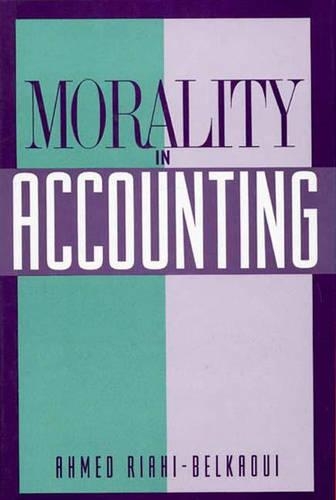
Morality in Accounting
(Hardback)
Publishing Details
Morality in Accounting
By (Author) Ahmed Riahi-Belkaoui
Bloomsbury Publishing PLC
Praeger Publishers Inc
30th August 1992
United States
Classifications
Tertiary Education
Non Fiction
Accounting
174
Physical Properties
Hardback
224
Description
Timely and reliable accounting information is essential. Not only firms themselves but the markets they serve, and particularly the investment community, depend on it. Accounting data and their interpretation must be above suspicion, says Riahi-Belkaoui, and to be sure of that, corporations and other users of accounting information must be certain that accountants subscribe to and practice morality set to high standards. What these standards are, and how they are deficient, distorted, and sometimes even fallacious, are the themes explored here. In doing so, Riahi-Belkaoui's book leads readers through the complexities of what the author identifies as the five aspects of accounting morality - fairness, ethics, honesty, social responsibility, and truth. Riahi-Belkaoui begins with a discussion of fairness as a concept of justice, illustrated by the intellectual contributions of Rawls, Nozick, and Gerwith. From there he moves to ethics in accounting, and a review of such ethical perspectives as the utilitarian, the deontological, and the notion of fittingness. He also takes up the subject of ethical codes, and asks how do we discipline the accounting profession; then, how do we teach and research accounting ethics Chapter three treats a variety of ethical issues and several key cases, among them the ESM Government Securities Case, the Drysdale Affair, and the Wedtech and Penn Square cases. In Chapter four Riahi-Belkaoui turns to honesty in the accounting environment and to discussions of the nature and framework of fraud, including what he calls "outcome situations arising from corporate fraud". Chapter five explores the relationship between accounting and social responsibility, and makes clear that there is a need for an "effective paradigm" to define and help implement a socially responsible accounting. Finally, in Chapter six he comes to grips with the problem of truth in accounting first, the notion of truth, then the impossibilities as well as the possibilities of attaining it. "Morality in Accounting" is intended to be of special value to the producers and users of accounting, and to graduate and undergraduate students of the accounting discipline.
Reviews
This is the latest in a lengthy and far-ranging series of books by the author. In the most recent work Riahi-Belkaoui tackles the issue of morality in accounting. He quickly attempts to show that this is a much broader subject than accounting ethics as he briefly explores several established theories of fairness and justice as foundations for ethics. He then proceeds to identify and discuss a number of current ethical dilemmas in the profession including the fundamental subject of honesty. As are all of his prior works, this one is very well documented with extensive footnote citations and a bibliography following each chapter. Most appropriate for faculty, graduate students, and practicing professionals.-Choice
"This is the latest in a lengthy and far-ranging series of books by the author. In the most recent work Riahi-Belkaoui tackles the issue of morality in accounting. He quickly attempts to show that this is a much broader subject than accounting ethics as he briefly explores several established theories of fairness and justice as foundations for ethics. He then proceeds to identify and discuss a number of current ethical dilemmas in the profession including the fundamental subject of honesty. As are all of his prior works, this one is very well documented with extensive footnote citations and a bibliography following each chapter. Most appropriate for faculty, graduate students, and practicing professionals."-Choice
Author Bio
AHMED RIAHI-BELKAOUI is Professor of Accounting at the University of Illinois at Chicago. He is the author of several accounting texts and more than 20 professional and scholarly books, mostly for Quorum, including Multinational Financial Accounting (1991), Cost Accounting: Theory and Practice (1991), and Judgment in International Accounting (1990).
